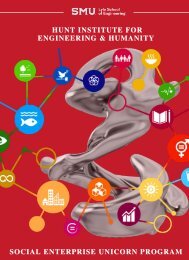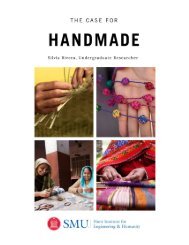Bridging the Gap in Diagnostics
Traditionally, biomedical engineers have developed technologies in response to the needs of the developed world’s medical community. These approaches often do not address the needs of the majority of the world’s peoples afflicted with both communicable and non-communicable diseases as the developments are far too costly and those with most need have, at best, limited access to supporting clinical laboratory infrastructure in developing countries. A gap in care has emerged as a result of these conditions. As a result, Drs. Beskok and Koklu have developed a Lab on a Chip technology that can test for a chosen disease with a turnaround time of just a few seconds and a detection limit of 1 ng of antigen per 1 mL of sample fluid. This is a great improvement to current devices on the market and is particularly useful in high-throughput, low-skill staffing environments. This report researched and authored by an interdisciplinary group of undergraduate students at the Southern Methodist University working in the Hunt Institute aims to address the areas of greatest need in response to UNSDG #3 "to ensure healthy lives and promote wellbeing for all at all ages."
Traditionally, biomedical engineers have developed technologies in response to the needs of the developed world’s medical community. These approaches often do not address the needs of the majority of the world’s peoples afflicted with both communicable and non-communicable diseases as the developments are far too costly and those with most need have, at best, limited access to supporting clinical laboratory infrastructure in developing countries. A gap in care has emerged as a result of these conditions. As a result, Drs. Beskok and Koklu have developed a Lab on a Chip technology that can test for a chosen disease with a turnaround time of just a few seconds and a detection limit of 1 ng of antigen per 1 mL of sample fluid. This is a great improvement to current devices on the market and is particularly useful in high-throughput, low-skill staffing environments. This report researched and authored by an interdisciplinary group of undergraduate students at the Southern Methodist University working in the Hunt Institute aims to address the areas of greatest need in response to UNSDG #3 "to ensure healthy lives and promote wellbeing for all at all ages."
Create successful ePaper yourself
Turn your PDF publications into a flip-book with our unique Google optimized e-Paper software.
EXECUTIVE SUMMARY
Figure 1: A Refugee Camp in Rwanda
With the recent launch of the Global Development Lab in the Hunter and Stephanie Hunt
Institute for Engineering and Humanity, fellows, faculty, and industry professionals have been
working to create meaningful solutions to promote a resilient humanity, addressing the UN’s
Sustainable Development Goals and challenges. The Institute has taken on Dr. Ali Beskok’s
project, the development of a low cost, portable, point of care device for humanitarian and health
applications.
Traditionally, biomedical engineers have developed technologies in response to the needs
of the developed world’s medical community. These approaches often do not address the needs
of the majority of the world’s peoples afflicted with both communicable and non-communicable
diseases as the developments are far too costly and those with most need have, at best, limited
access to supporting clinical laboratory infrastructure in developing countries. A gap in care has
emerged as a result of these conditions.
7














